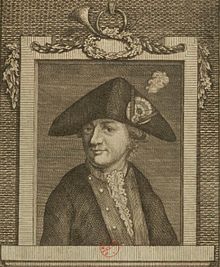Jean-Baptiste Drouet
Jean-Baptiste Drouet (born January 8, 1763 in Sainte-Menehould , Département Marne , † April 10, 1824 in Mâcon ) was a French revolutionary. He became known as the postmaster of Sainte-Menehould.
Life
Jean-Baptiste Drouet was the son of a woodcutter. He became postmaster in Sainte-Menehould in 1789 and founded a Jacobin club there that same year.
Drouet recognized the fleeing Louis XVI on June 21, 1791 . and immediately initiated measures to arrest him in Varennes . In September 1792 Drouet was elected to the National Convention by his home department of Marne . He approached the mountain party , voted for the death of the king and took an active part in the overthrow of the Girondins (May 31 to June 2, 1793). In September 1793 he was sent to the Northern Army as a "representative in mission" . But Drouet was captured in Austria in Maubeuge in October 1793 , which he had to spend at the Spielberg fortress in Brno. In September 1795 he returned to France as a result of an exchange of prisoners.
The popular returnees immediately resumed his seat in the National Convention. After the dissolution of the National Convention, Drouet was elected to the Council of Five Hundred . He joined the “Society of Friends of the Republic” , which held its meetings near the Panthéon and therefore became known as the “Panthéon Club” . Despite the deep disagreements with Babeuf , Drouet supported his “ conspiracy of equals ” . On May 10, 1796, the conspirators were arrested. The public took a great interest in Drouet's arrest, as he was considered a symbol of Republicanism.
Under Article 114 of the 1795 Constitution, members of the Legislative Body could not be tried before a criminal court. The state court responsible according to the constitution only existed on paper. With a narrow majority, the members of the Council of Five Hundred Drouets decided to revoke immunity. On August 17, 1796, however, Drouet was able to escape from prison and in October 1796 cross the border into Switzerland. This enabled him to evade charges. The Paris public was firmly convinced that Paul Barras did not want to bring the famous revolutionary hero to justice and therefore made it possible for Drouet to escape.
After the coup d'état of the 18th Fructidor V (September 4, 1797) Drouet returned to France again. In the summer of 1799 he founded the neo-Jacobin “ Manege Club ”, and he acted as its first “regulator”. From 1802 to 1814 he served as sub-prefect of Sainte-Menehould. After the return of the Bourbons , Jean-Baptiste Drouet lived under false names and in secret in Mâcon. He died there on April 10, 1824.
literature
- Bernd Jeschonnek: Revolution in France 1789–1799. A lexicon. Akademie-Verlag, Berlin 1989, ISBN 3-05-000801-6 .
- Katharina Middell, Matthias Middell: François Noël Babeuf. Martyrs of equality. New Life, Berlin 1988, ISBN 3-355-00604-1 .
Web links
| personal data | |
|---|---|
| SURNAME | Drouet, Jean-Baptiste |
| ALTERNATIVE NAMES | Drouet, Jean Baptiste |
| BRIEF DESCRIPTION | French revolutionary, postmaster of Sainte-Menehould |
| DATE OF BIRTH | January 8, 1763 |
| PLACE OF BIRTH | Sainte-Menehould |
| DATE OF DEATH | April 10, 1824 |
| Place of death | Mâcon |

